College university learning materials
Best offer and quality materials from Ramnurse-Nursing proffesor
- 382
- 0
- 7
Community
- Followers
- Following
65 Reviews received
416 items
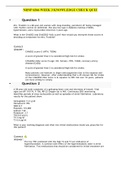
NRNP 6566 WEEK 3 KNOWLEDGE CHECK QUIZ
NRNP 6566 WEEK 3 KNOWLEDGE CHECK QUIZ Mrs. Franklin is a 68-year-old woman with long-standing, persistent AF being managed with rhythm control on dofetilide. She also has type 2 diabetes mellitus (T2DM), hypertension, and a myocardial infarction 3 years ago. What is her CHADS2 and CHA2DS2-VASc score? How would you interpret those scores in deciding on treatment for Mrs. Franklin? Correct Answer: CHADS2 score=2 (HTN, T2DM) A score of greater than 2 is considered high risk for stroke. CH...
- Exam (elaborations)
- • 6 pages •
NRNP 6566 WEEK 3 KNOWLEDGE CHECK QUIZ Mrs. Franklin is a 68-year-old woman with long-standing, persistent AF being managed with rhythm control on dofetilide. She also has type 2 diabetes mellitus (T2DM), hypertension, and a myocardial infarction 3 years ago. What is her CHADS2 and CHA2DS2-VASc score? How would you interpret those scores in deciding on treatment for Mrs. Franklin? Correct Answer: CHADS2 score=2 (HTN, T2DM) A score of greater than 2 is considered high risk for stroke. CH...
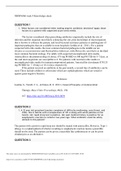
NRNP6566 week 9 Knowledge check
QUESTION 1 1. What factors are considered when making empiric antibiotic decisions? Apply those factors to a patient with suspected acute otitis media. QUESTION 2 1. A 32 year old preschool teacher complains of difficulty swallowing, sore throat, and chills. She is febrile with a temperature of 101.6 along with white patches on her tonsils. Her rapid strep test is positive. Her past medical history is positive for an anaphylactic reaction to cefaclor two years ago. What antibiotic could b...
- Exam (elaborations)
- • 6 pages •
QUESTION 1 1. What factors are considered when making empiric antibiotic decisions? Apply those factors to a patient with suspected acute otitis media. QUESTION 2 1. A 32 year old preschool teacher complains of difficulty swallowing, sore throat, and chills. She is febrile with a temperature of 101.6 along with white patches on her tonsils. Her rapid strep test is positive. Her past medical history is positive for an anaphylactic reaction to cefaclor two years ago. What antibiotic could b...
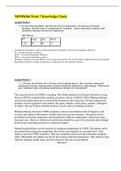
NRNP6566 Week 7 Knowledge Check
NRNP6566 Week 7 Knowledge Check pH pCO2 pO2 HCO3 7.36 30 80 15 Compensated metabolic acidosis with no hypoxemia (metabolic acidosis with respiratory alkalosis) Ph – normal (leaning on acidosis ) pCO2 – decreased (respiratory alkalosis) HCO3 – decreased (rmetabolic acidosis) Metabolic acidosis (decreased HCO3) with no hypoxemia (pO2 is 80, normal) Fully compensated due to normal pH. Respiratory (pCO2) is leading to alkalemia to compensate for the metabolic acidosis.
- Exam (elaborations)
- • 7 pages •
NRNP6566 Week 7 Knowledge Check pH pCO2 pO2 HCO3 7.36 30 80 15 Compensated metabolic acidosis with no hypoxemia (metabolic acidosis with respiratory alkalosis) Ph – normal (leaning on acidosis ) pCO2 – decreased (respiratory alkalosis) HCO3 – decreased (rmetabolic acidosis) Metabolic acidosis (decreased HCO3) with no hypoxemia (pO2 is 80, normal) Fully compensated due to normal pH. Respiratory (pCO2) is leading to alkalemia to compensate for the metabolic acidosis.
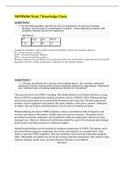
NRNP6566 Week 7 Knowledge Check
QUESTION 1 1. For the following ABGs, identify the level of hypoxemia, the primary acid base disorder, and the type of compensation. Example - acute respiratory acidosis with metabolic alkalosis and severe hypoxemia
- Exam (elaborations)
- • 7 pages •
QUESTION 1 1. For the following ABGs, identify the level of hypoxemia, the primary acid base disorder, and the type of compensation. Example - acute respiratory acidosis with metabolic alkalosis and severe hypoxemia
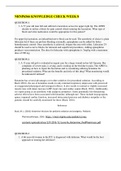
NRNP6566 KNOWLEDGE CHECK WEEK 8
QUESTION 1 1. A 77 year old man fell and suffered a laceration across his upper right lip. The APRN decides to utilize a block for pain control which suturing the laceration. What type of block and what medication would be appropriate for this patient? For upper lip laceration, an infraorbital nerve block can be used. The anesthetic of choice is plain lidocaine but if there are profuse bleeding externally, epinephrine can be added for better hemodynamic control. Once anesthesia is achieved...
- Exam (elaborations)
- • 6 pages •
QUESTION 1 1. A 77 year old man fell and suffered a laceration across his upper right lip. The APRN decides to utilize a block for pain control which suturing the laceration. What type of block and what medication would be appropriate for this patient? For upper lip laceration, an infraorbital nerve block can be used. The anesthetic of choice is plain lidocaine but if there are profuse bleeding externally, epinephrine can be added for better hemodynamic control. Once anesthesia is achieved...
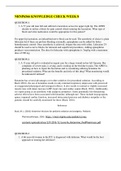
NRNP6566 KNOWLEDGE CHECK WEEK 8
QUESTION 1 1. A 77 year old man fell and suffered a laceration across his upper right lip. The APRN decides to utilize a block for pain control which suturing the laceration. What type of block and what medication would be appropriate for this patient? For upper lip laceration, an infraorbital nerve block can be used. The anesthetic of choice is plain lidocaine but if there are profuse bleeding externally, epinephrine can be added for better hemodynamic control. Once anesthesia is achieved...
- Exam (elaborations)
- • 6 pages •
QUESTION 1 1. A 77 year old man fell and suffered a laceration across his upper right lip. The APRN decides to utilize a block for pain control which suturing the laceration. What type of block and what medication would be appropriate for this patient? For upper lip laceration, an infraorbital nerve block can be used. The anesthetic of choice is plain lidocaine but if there are profuse bleeding externally, epinephrine can be added for better hemodynamic control. Once anesthesia is achieved...
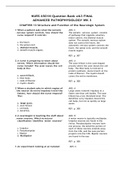
NURS 6501N Question Bank wk3 FINAL ADVANCED PATHOPHYSIOLOGY WK 3
1 When a patient asks what the somatic . nervous system controls, how should the nurse respond? It controls: a. the heart. b. the spinal cord. c. skeletal muscle. d. smooth muscle organs. ANS: C The somatic nervous system consists of pathways that regulate voluntary motor control, the skeletal muscle system. The somatic nervous system does not control the heart; the autonomic nervous system controls the heart, the spinal cord, and the smooth muscle organs. REF: p. 307
- Exam (elaborations)
- • 63 pages •
1 When a patient asks what the somatic . nervous system controls, how should the nurse respond? It controls: a. the heart. b. the spinal cord. c. skeletal muscle. d. smooth muscle organs. ANS: C The somatic nervous system consists of pathways that regulate voluntary motor control, the skeletal muscle system. The somatic nervous system does not control the heart; the autonomic nervous system controls the heart, the spinal cord, and the smooth muscle organs. REF: p. 307
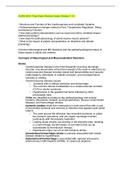
NURS 6501 Final Exam Review Guide
NURS 6501 Final Exam Review Guide (Weeks 7-11) • Structure and Function of the Cardiovascular and Lymphatic Systems • Pathophysiological changes related to Pain, Temperature Regulation, Sleep, and Sensory Function • How does patient characteristics such as racial and ethnic variables impact altered physiology? • How does the pathophysiology of spinal injuries impact patients? • What is the impact of patient characteristics on disorders and altered physiology. Common Neurologi...
- Exam (elaborations)
- • 24 pages •
NURS 6501 Final Exam Review Guide (Weeks 7-11) • Structure and Function of the Cardiovascular and Lymphatic Systems • Pathophysiological changes related to Pain, Temperature Regulation, Sleep, and Sensory Function • How does patient characteristics such as racial and ethnic variables impact altered physiology? • How does the pathophysiology of spinal injuries impact patients? • What is the impact of patient characteristics on disorders and altered physiology. Common Neurologi...
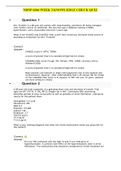
NRNP 6566 WEEK 3 KNOWLEDGE CHECK QUIZ
NRNP 6566 WEEK 3 KNOWLEDGE CHECK QUIZ Mrs. Franklin is a 68-year-old woman with long-standing, persistent AF being managed with rhythm control on dofetilide. She also has type 2 diabetes mellitus (T2DM), hypertension, and a myocardial infarction 3 years ago. What is her CHADS2 and CHA2DS2-VASc score? How would you interpret those scores in deciding on treatment for Mrs. Franklin? Correct Answer: CHADS2 score=2 (HTN, T2DM) A score of greater than 2 is considered high risk for stroke. CH...
- Exam (elaborations)
- • 6 pages •
NRNP 6566 WEEK 3 KNOWLEDGE CHECK QUIZ Mrs. Franklin is a 68-year-old woman with long-standing, persistent AF being managed with rhythm control on dofetilide. She also has type 2 diabetes mellitus (T2DM), hypertension, and a myocardial infarction 3 years ago. What is her CHADS2 and CHA2DS2-VASc score? How would you interpret those scores in deciding on treatment for Mrs. Franklin? Correct Answer: CHADS2 score=2 (HTN, T2DM) A score of greater than 2 is considered high risk for stroke. CH...
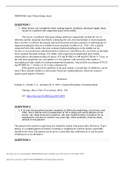
NRNP6566 week 9 Knowledge check
QUESTION 1 1. What factors are considered when making empiric antibiotic decisions? Apply those factors to a patient with suspected acute otitis media. QUESTION 2 1. A 32 year old preschool teacher complains of difficulty swallowing, sore throat, and chills. She is febrile with a temperature of 101.6 along with white patches on her tonsils. Her rapid strep test is positive. Her past medical history is positive for an anaphylactic reaction to cefaclor two years ago. What antibiotic could b...
- Exam (elaborations)
- • 6 pages •
QUESTION 1 1. What factors are considered when making empiric antibiotic decisions? Apply those factors to a patient with suspected acute otitis media. QUESTION 2 1. A 32 year old preschool teacher complains of difficulty swallowing, sore throat, and chills. She is febrile with a temperature of 101.6 along with white patches on her tonsils. Her rapid strep test is positive. Her past medical history is positive for an anaphylactic reaction to cefaclor two years ago. What antibiotic could b...

NSG 6020 WEEK 3 QUIZ WITH ANSWERS – RESPIRATORY
PATHOPHYSIOLOGY 8TH EDITION MCCANCE TEST BANK / TEXT BANK McCance, Huether Pathophysiology The Biological, Complete all chapters, /
FNP MSN 560 >Chapter 1-30 Complete Test Bank> ANSWERS AND RATIONALES FNP MSN 560
FNP MSN 560 >Chapter 1-30 Complete Test Bank> ANSWERS AND RATIONALES FNP MSN 560
PATHOPHYSIOLOGY 8TH EDITION MCCANCE TEST BANK / TEXT BANK McCance, Huether Pathophysiology The Biological, Complete all chapters, /